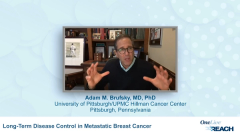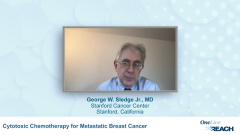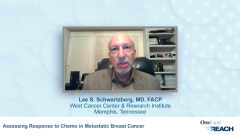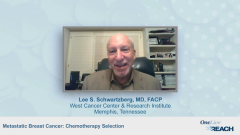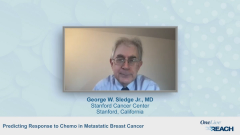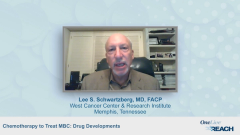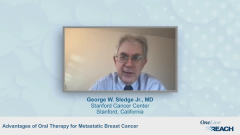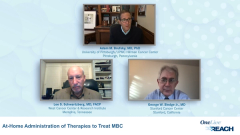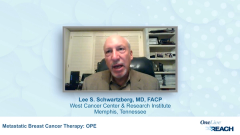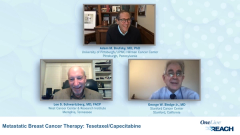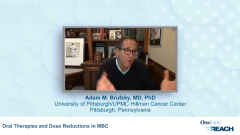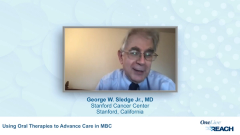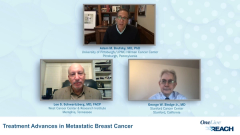
Metastatic Breast Cancer Therapy: OPE
Episodes in this series

Adam M. Brufsky, MD, PhD: I want to spend a bit of time, maybe another 15 minutes, talking specifically about some oral therapies for metastatic breast cancer because it is important to understand and put all of this in context and get some generalities out of it. We have 1 that is a bit further along: that is the Athenex Inc product, OPE [oral paclitaxel and encequidar]. I do not know what it is called. Is there even a name yet? I do not even know what it is called, but we have that.
We now have the CONTESSA trial with tesetaxel. It was just presented at San Antonio Breast Cancer Virtual Symposium 2020, and I am curious to hear what you guys think of these particular agents. We can start with what we call OPE: it is oral paclitaxel and encequidar. Did you guys participate in those? I think Lee, you did. You are on those papers, are you not?
Lee S. Schwartzberg, MD, FACP: No. I have a lot of experience with tesetaxel. The other one is called Oraxol [oral paclitaxel and encequidar].
Adam M. Brufsky, MD, PhD: Oraxol [oral paclitaxel and encequidar]. George, were you involved in any of that?
George W. Sledge Jr., MD: No, I was not involved with the OPE [oral paclitaxel and encequidar], but our institution, Stanford Cancer Center, did participate in the CONTESSA trial.
Adam M. Brufsky, MD, PhD: Let's start with OPE [oral paclitaxel and encequidar]. What do you think of it? It is interesting. When you think about it, it is like a trade-off. You have a drug that was compared to every 3 week paclitaxel, which is a problem, but we can let that go for a minute. We can assume for a minute that that is OK.
It is then, basically, a complicated scenario where you have to be fasting at night and then wake up, you take the encequidar, and you then wait an hour. You then have to take all the paclitaxel pills, that can be up to 15 based on your body surface area, within 30 minutes. Then you cannot eat for 2 more hours. You have to do that for 3 weeks on 3 days out of 7. That is the good part.
It looks like it has a decent PFS [progression-free survival] and a decent response rate: what you expect from those taxanes or maybe a bit better, but it is hard to know because they compared it to Q3 [every 3 week] therapy. What you get is this: you get an all oral therapy, No. 1, but you also do not get much neuropathy, at least theoretically in the trials.
This is the issue: let’s get back to the trade-offs you have to make. As a general idea, would women go for this, do you think? Would doctors go for it? Would they say, “Your neuropathy is less. You do not have to come into clinic, but you have this complicated regimen that you have to remember to do 3 days out of 7.” Do you think people would go for that?
Lee S. Schwartzberg, MD, FACP: It is going to be a challenge. The efficacy data look good from what we saw, with the caveat that we compared it to an old regimen that we do not typically use, so it is hard to know against weekly paclitaxel. I am concerned about the pill burden, Adam. It is huge. Many of the patients who I see in a community setting will have a challenge with the directions and with doing it correctly. That could go in 2 directions: 1, many will skip doses, and 2, some will take doses incorrectly, which may lead to more toxicity. Of course, if you have 1 bad toxicity with an oral therapy, those patients do not like to take it again. That has been my experience. You have to be careful.
Adam M. Brufsky, MD, PhD: And then the doctors do not like to give it.
Lee S. Schwartzberg, MD, FACP: The doctors do not like to give it, exactly. It is a challenge with the way it is formulated. Hopefully, the company is working on making a somewhat simpler formulation. We have seen that in a few other oral drugs like some of the PARP inhibitors, which have gotten to less of a pill burden over time as they have improved their formulations. Hopefully, we can do that here. It is a big pill burden and a complicated schedule, which is going to limit its use, even though it does seem to be effective.
Adam M. Brufsky, MD, PhD: The neuropathy is the trade-off. You could tell people. That is my problem: that is a dose-limiting toxicity, most of the time. I have people, as you guys probably do too, who have been on weekly paclitaxel for a year or more.
It eventually gets to the point where they cannot button their clothes. That is usually when I stop. For me, that is grade 3: when they cannot button their clothes during the morning. I ask them that every time they come in. I say, “Can you button your clothes?” They never want to stop because they are responding to it. I say, “Listen, alright, enough is enough. We have to either cut you, give you a couple of weeks off, or stop.” George, what do you think about this? To be able to potentially not have neuropathy for continuous use but to have all of this tough pill burden, there is always that trade-off that you have. What do you think?
George W. Sledge Jr., MD: You are reminding me of my mother who, as soon as she looked at a pill in a bottle, would start gagging. I am trying to imagine her taking that dose. You obviously need a compliant, well-educated, and well-instructed patient. That is an issue.
Anything that allows you to get away from peripheral neuropathy, of course, is a positive. I am always skeptical about peripheral neuropathy early on because I remember the nab-paclitaxel where we were repeatedly told that it had less peripheral neuropathy than paclitaxel by people who should have known better. I would like to wait and see more data on that, but if it indeed has less peripheral neuropathy, then it will certainly be embraced by physicians and patients.
Transcript Edited for Clarity


